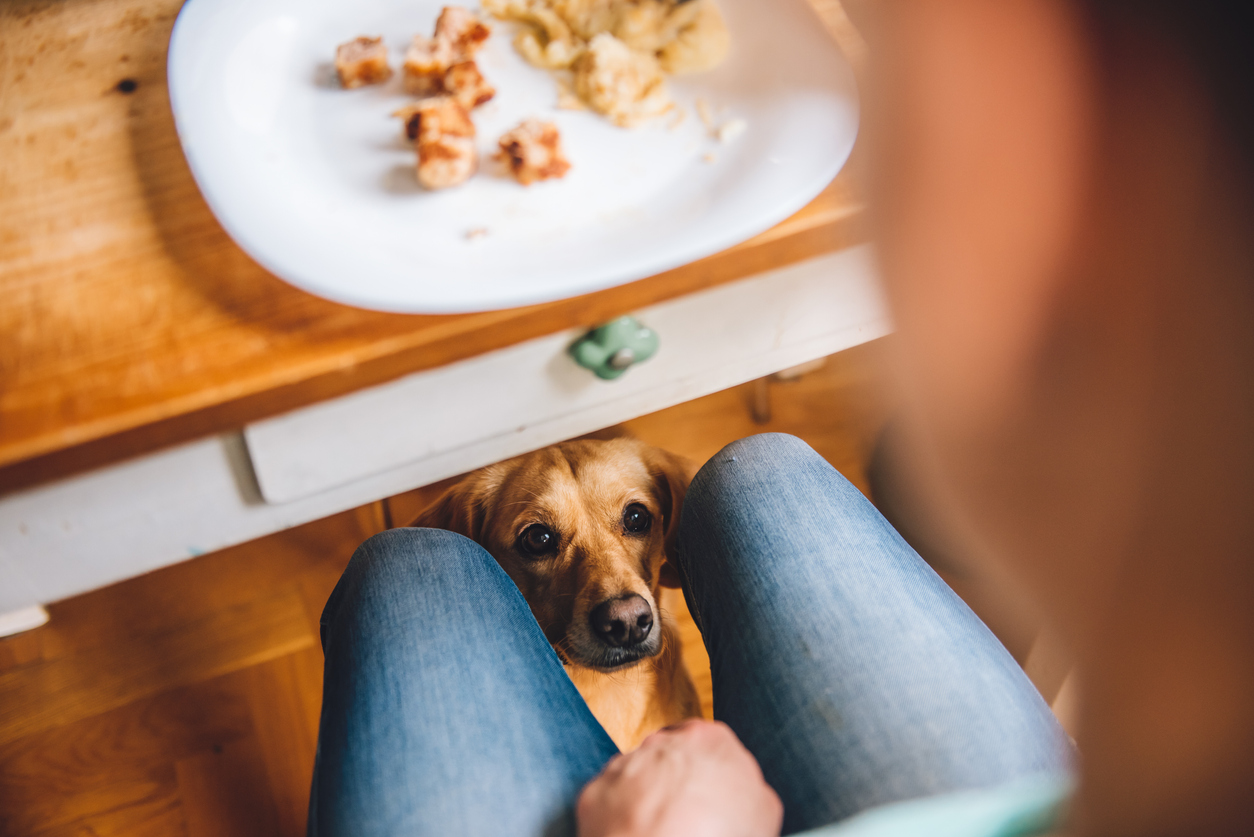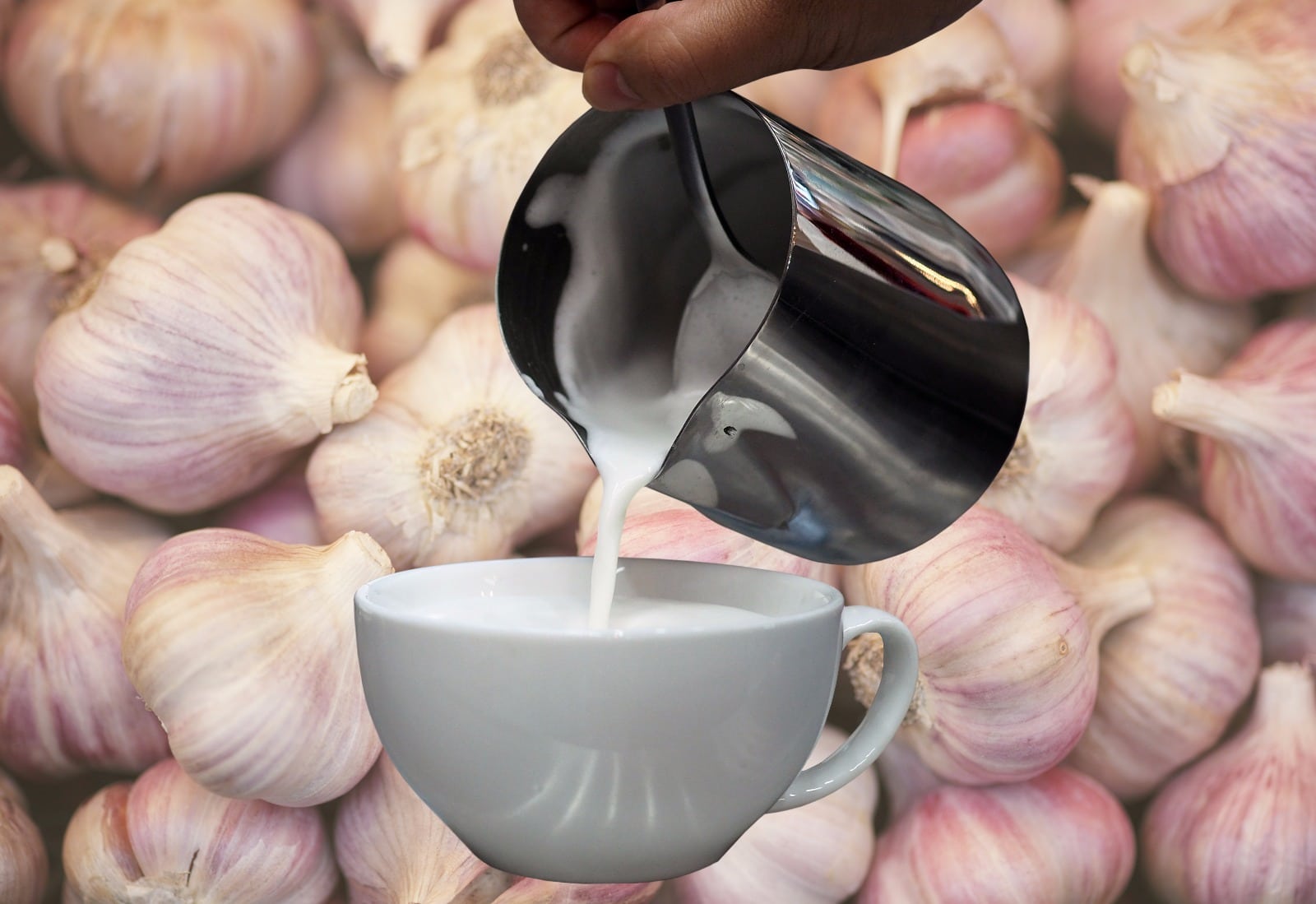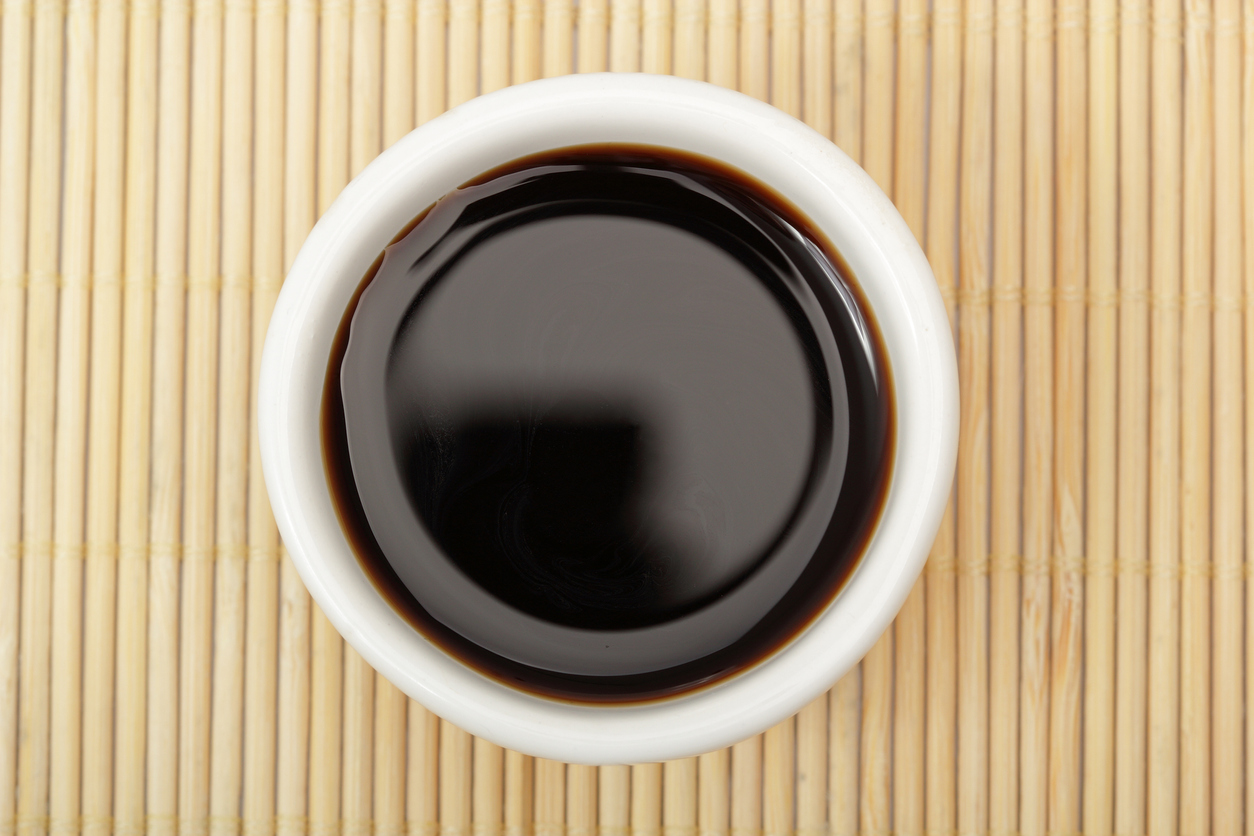We’ve all watched the scene in a TV show or movie of a kid scraping vegetables under the table for the family dog to eat. It might make for great entertainment, but in reality, is it a good idea to feed your dog all of your leftovers? The short answer is no.
Although your dog might give you puppy eyes begging for even the tiniest taste of whatever you’re eating, there are certain foods dogs can’t eat that humans can. According to Healthline, humans and dogs metabolize food differently, which is why some of our favorite foods may be toxic to our four-legged friends. Even if a certain food might not necessarily be toxic for dogs, it’s always safe to only offer up the snack in moderation. This is especially true for foods high in sugar or calories.
It’s also important to note that all dogs are different and, like humans, can have food sensitivities and intolerances as well. Common food sensitivities for dogs can be from wheat, soy, milk, or even popular dog food flavors beef and chicken, American Kennel Club reported.
But not all human food is bad for your dog. Just make sure to consult your vet if you have any questions or concerns. And with that in mind, here are 16 foods both you and your dog can enjoy together.
1. Pumpkin
Whether it’s during the holiday season or you’re simply in the mood for making pumpkin pie, it’s safe to give your dog a bit of the main ingredient if you’re using canned pumpkin.
According to Purina veterinarian Dr. Ruth Ann Lobos, pumpkin “is a fabulous source of fiber and can even help with digestive upset” and is “a great source of potassium, vitamin A, iron and beta carotene.” It’s also a good option if you’re looking to have your dog cut back a few pounds. Pumpkin is “low in calories and could help with weight loss if substituted for a portion of their daily kibble.”
2. Carrots
Carrots are filled with vitamins and minerals such as beta carotene, vitamin K, and potassium.
Not only are they good for humans, but they’re good for dogs too. According to Purina, it’s okay for dogs to eat all parts of the carrot, including the leafy green tops. Dogs can enjoy this treat raw or cooked, but be sure to cut the vegetables into bite-size pieces so they don’t choke!
3. Watermelon
Great summer news!
This juicy summer fruit is perfectly fine for dogs to eat. The fruit is low in calories, hydrating, and contains vitamins such as vitamin A, vitamin B6, vitamin C, and potassium, but watch out for seeds. According to the American Kennel Club, seeds should be removed to prevent any blockage of the intestines.
4. Eggs
Yes, one of our favorite breakfast foods is okay for dogs to eat too.
Eggs are a great source of protein and vitamins for both humans and dogs. Just like humans, dogs can get Salmonella from raw eggs, so it’s best to only treat your dog to boiled or cooked eggs, according to the American Kennel Club. They’re also good treats to relieve your dog’s upset stomach.
5. Yogurt
Plain, Greek, and unsweetened yogurt are good for dogs in moderation.
Although yogurt isn’t toxic for dogs, it contains milk and could be problematic for dogs who are lactose intolerant, according to the American Kennel Club. If your dog doesn’t have a dairy sensitivity, then yogurt with probiotics can actually help with their digestive system. You should also watch out for artificial sweeteners that can be toxic to dogs, such as xylitol, Vet Street reported.
6. Bananas
Bananas contain potassium, vitamin B6, and vitamin C, and a lot of fiber, which are beneficial for dogs.
According to Purina, peeled bananas are best for dogs even though the peels themselves aren’t toxic. Banana peels are high in fiber, which can upset your dog’s stomach if they aren’t used to it. They also may be hard to digest and might cause intestinal blockage. (Plus, eating a banana peel doesn’t sound like the most enjoyable task.)
7. Celery
The vegetable has become increasingly popular in the past few years with more and more people hopping on the celery juice trend, but the vegetable is also a safe treat for your dog.
Celery is full of antioxidants, can reduce inflammation, and can help with digestion, Healthline reported. Dogs can also reap the benefits of munching on this treat, especially if they’re overweight, according to the American Kennel Club. Another bonus of this vegetable for dogs is that it can also help keep bad breath at bay.
8. Peanut Butter
Peanut butter is a delicious treat packed with protein.
It also contains healthy fats, vitamin B, vitamin E, and niacin, according to the American Kennel Club. But not all peanut butter is good for dogs. It’s best to find peanut butter that’s unsalted and doesn’t contain too much sodium, and most importantly, doesn’t contain the artificial sweetener xylitol, Preventive Vet reported.
9. Quinoa
Quinoa has tons of protein and contains plenty of vitamins and minerals.
This trendy health food staple is also okay for dogs to eat too. According to the American Kennel Club, quinoa can be found in some brands that make dry dog food. One thing to watch out for is a natural chemical produced by quinoa plants, saponin. Although traces of the chemical are small in the quinoa we eat, it may give your dog an upset stomach.
10. Salmon
There are so many health benefits to eating salmon, from the omega-3 fatty acids to the protein it provides.
In addition to being a tasty treat, salmon can also benefit your dog’s coat. If it’s looking more on the dull side and even a little flaky, incorporating salmon in your dog’s diet can help it become softer and silkier, according to Purina. It’s used in a lot of dog food and can be a good alternative if your dog is allergic or has a sensitivity to chicken or beef flavors.
11. Blueberries
Blueberries don’t have many calories and are high in nutrients and antioxidants, according to Healthline.
These health benefits don’t just apply to humans, but to dogs too. Blueberries can boost both you and your dog’s immune system, according to Purina. If you want to make a tasty treat for you and your pup, you can make frozen plain yogurt covered blueberries that you can both enjoy. The only downside is that since blueberries are small, dogs can potentially choke on them. So you might want to mush them up a bit before serving.
12. Pineapples
Not only are pineapples trendy in home decor, but they’re also a delicious tropical snack that dogs can enjoy too.
Pineapples have a long list of health benefits from containing powerful antioxidants to enzymes that can help with digestion, along with being loaded with vitamins and nutrients, according to Healthline. Giving your dog small amounts of pineapple can be a great treat, but be sure not to overdo it. As healthy as it can be, pineapple contains a lot of fiber and sugar, and can upset your dog’s stomach, according to the American Kennel Club.
13. Apples
Apples are a quick and easy snack that dogs can munch on too!
If you’re going to treat your dog to an apple, you can cut it into slices or chunks. You’re also going to want to make sure your dog doesn’t eat the apple core or seeds. According to Pet MD, there’s cyanide in apple seeds, which can be toxic for dogs. If your dog is sensitive to too much fiber, you can peel the apple too.
14. Green Peas
Green peas are typically low in calories, and high in nutrients and antioxidants.
Green peas are a great treat for dogs every once in a while and are even found in some dog food, according to the American Kennel Club. Most peas, such as sugar snap or snow peas, are perfectly fine for dogs to eat, but try to limit canned peas because of their high levels of sodium.
15. Mangos
Mango is another tropical fruit on our list and is a great treat for dogs.
Mangos are sweet, refreshing, and nutritious, but not all parts of mango are safe for dogs to eat, according to Purina. Mango flesh is fine, but mango skin might have too much fiber and can upset your dog’s stomach. Mango pits also contain the chemical cyanide, which is toxic to dogs.
16. Oatmeal
Lastly, this breakfast food is also great for your dog in moderation.
Oatmeal is a great food with plenty of nutrients and antioxidants. For dogs, its health benefits extend to maintaining a healthy coat, according to the American Kennel Club. If your dog has a sensitivity to wheat or grains, oatmeal can also be a good alternative, Dr. Carly Fox of New York City’s Animal Medical Center told the American Kennel Club.






